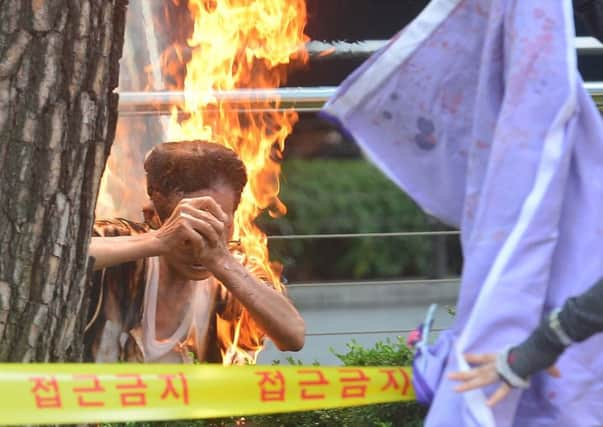South Korean sets himself ablaze outside Japan embassy


The rally, held in front of the Japanese embassy and attended by hundreds of people, was staged days before the 70th anniversary of the Allied victory in the Second World War that freed the Korean peninsula from Japanese imperial rule.
Kim Sun-min, who was among several people who dashed to put out the flames, said he didn’t notice the man, identified by police as Choi Yeon-yeol, before he set himself ablaze on a flower bed near the rally. Lumps of burned cotton and a small glass bottle that smelled of gasoline were found at the scene. The rally continued after Mr Choi was taken to the hospital.
Advertisement
Hide AdAdvertisement
Hide AdMr Choi suffered third-degree burns on his face, neck, upper body and arms and was relying on a breathing machine after his lungs deteriorated, said an official at Seoul’s Hallym University Hangang Sacred Heart Hospital, who declined to be named.
Mr Choi’s exact motives were not immediately clear. A five-page statement found in his bag, apparently written by himself, contained condemnatory remarks about Japan over its stance on issues related to its occupation of Korea and wartime conduct, according to a Seoul police official.
Since 1992, activists have organised weekly protests in front of the Japanese embassy to demand justice for South Korean women – known as comfort women who were forced to work as sex slaves for the Japanese military during the war. The gatherings have been mostly peaceful. The turnout was particularly high yesterday as the countries approached the anniversary.
Many South Koreans harbour deep resentment toward Japan over its occupation. Hundreds of thousands of Koreans were forced to fight as front-line soldiers, work under slave-labour conditions or serve as prostitutes in brothels operated by the Japanese military during the war.
Such sentiment has strengthened in recent years over what South Koreans feel are attempts by Japan to downplay its wartime conduct, as well as Tokyo’s territorial claims to islands occupied by South Korea.
Protests sometimes turn violent. Scuffles with police are common and demonstrators have severed their own fingers or hurled excrement at the embassy in the past.
South Korea was a Japanese colony from 1910 to 1945, and unresolved disputes from that era still loom over the two countries’ relations. The two sides signed a treaty establishing diplomatic relations in 1965. Japan, under the treaty’s obligations, provided economic aid and loans as redress for its occupation.
Tokyo has argued that the treaty settled all wartime grievances and that it is under no obligation to address additional claims. But the comfort women say that they have not been properly compensated for the brutality they endured. They contend that the treaty was strictly a governmental agreement, and failed to address their individual grievances.
Advertisement
Hide AdAdvertisement
Hide AdA South Korean government registry counts only 47 surviving comfort women.
On Saturday, South Korea will mark the 70th anniversary of its independence from Japan with a nationwide celebration – many streets in Seoul are already decked out with banners and flags. On that same day, Japanese prime minister Shinzo Abe is scheduled to deliver a speech to mark the anniversary of the end of the war.